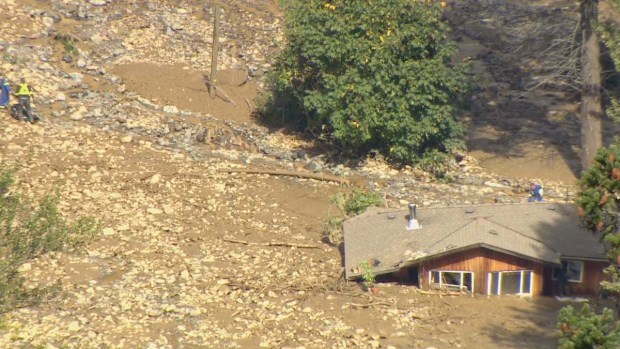A man whose home was caught in the Birken landslide of 2015 has launched a lawsuit that blames several government bodies and companies for the loss of his home.
Birken is a community to the northeast of Pemberton that made headlines after several homes were destroyed in the disaster.
Ken Meyer is suing the Ministry of Forests, the Ministry of Transportation, CN Rail, BC Hydro and the Squamish-Lillooet Regional District for damages and costs, among other things.
He says in his claim his property was destroyed on September 20, 2015 after his home and shop were buried in up to four metres of debris.
“SLRD, MoF and/or MoT failed or refused to warn, notify or otherwise inform Mr. Meyer of the risk and the dangers associated with the hazardous zone,” reads Meyer’s notice of civil claim.
“Had SLRD, MoF and/or MoT warned Mr. Meyer of the risk and the dangers associated with the hazardous zone, Mr. Meyer would not have suffered the loss.”
As is customary with lawsuits in B.C., the amount of money sought is not listed in the notice of civil claim.
However, Meyer’s lawyer told The Chief that the goal of the suit was to recover what had been lost.
“He’s just looking to be made whole for the losses that he suffered due to this unfortunate event,” said Seema Lal of SHK Law Corporation. “We just got some concerns that there were perhaps some bodies that ought to have been a little bit more involved in terms of monitoring the area and maybe initiating some sort of mitigation strategy.”
She declined to comment further.
The notice of claim also adds that BC Hydro and CN Rail conducted operations in the area.
The document says that BC Hydro owned, operated and maintained two strings of transmission towers and lines in that zone, while CN Rail had a railway line running through that area.
“The likelihood of occurrence of these natural hazards is increased and/or exacerbated by the hydro and/or rail operations,” the claim says.
According to the document, Meyer had no knowledge of landslide risks in the area.
His property, which included a log home and a workshop, was inspected and approved by the SLRD, his notice of claim says.
However, the claim alleges “since approximately November 1994, SLRD, MoT and/or MoF had and continue to have full knowledge of and information on the risk and the hydro and rail operations.”
Three of the defendants named in the case have responded by filing statements of defence in court.
The Squamish-Lillooet Regional District denies that it owed a duty of care to warn Meyer and also disputes his description of the area as a “hazardous zone.”
It also adds that the construction of his house and shop were approved around 1988 and 1986, respectively.
“The plaintiff’s claims are statute-barred against the regional district by reason of expiration of the relevant limitation period,” the SLRD’s statement of defence says.
Furthermore, the regional district says that despite the “absence of a duty of care to warn the plaintiff,” all members of the public, including Meyer, were “reasonably warned by the regional district.”
Information contained in the SLRD Area C Official Community Plan No. 689, 1999 Amendment Bylaw No. 1008, 2008 contained a 1994 terrain stability report, the regional district says.
The SLRD says this stability report had a three-tiered rating system that showed areas of varying degrees of risk.
“At all material times the regional district made the Baumann and Yonin [terrain stability] report available for review by members of the public, including the plaintiff,” says the regional district’s statement of defence. “The adoption and public availability at all material times of the OCP bylaw constitutes an adequate and reasonable warning to all members of the public.”
“The Regional District has denied Mr. Meyer’s claim and is defending the claims made against it in the lawsuit which he has brought against various parties, including the Regional District,” wrote Jeff Locke, the SLRD’s lawyer, in an email.
The SLRD is opposed to granting Meyer any of the relief he seeks.
BC Hydro and CN Rail, the other two defendants which have filed statements of defense so far, also are opposed to granting Meyer any relief.
Both corporations say they did not owe a duty of care to warn Meyer.
“CN specifically denies that the landslide referred to in the notice of civil claim herein was caused, in whole or in part, by any of CN’s operations,” reads the company’s statement of defence.
When contacted for comment, CN Rail spokesman Patrick Waldron reaffirmed that the corporation’s position that it was not responsible for Meyer’s loss, but declined to comment further.
BC Hydro was contacted for comment via its legal counsel, but did not respond before press deadline.
The Ministry of Transportation and the Ministry of Forests have not yet filed statements of defence for this case.
Both ministries were contacted for comment.
“We are aware of the action before the courts related to this suit,” said a spokesperson for the Ministry of Transportation in a written statement. “As this is a matter before the courts, the ministry cannot provide further comment at this time.”
A spokesperson from the Ministry of Forests said the department would not comment on the matter because it was before the courts.
***CORRECTION: Please note this article has been corrected. A previous version mistakenly referred to CN Rail as a Crown corporation.




